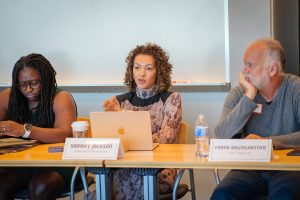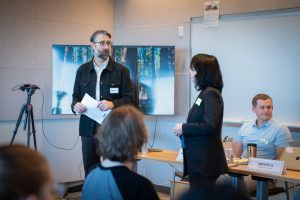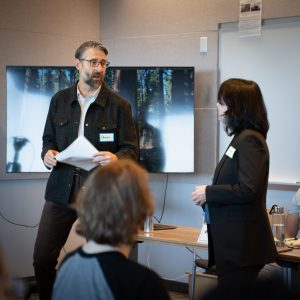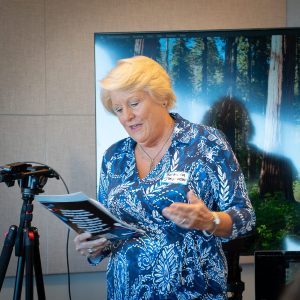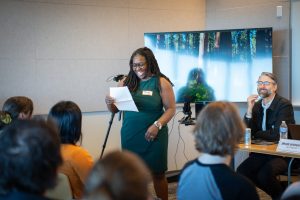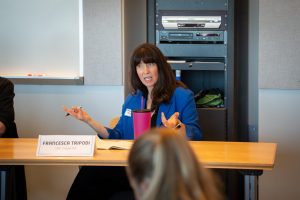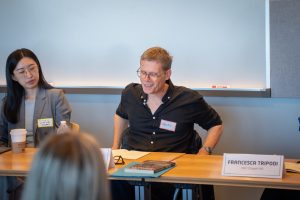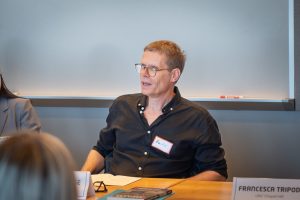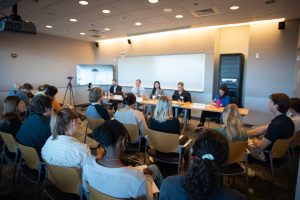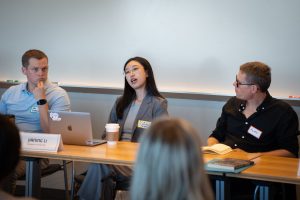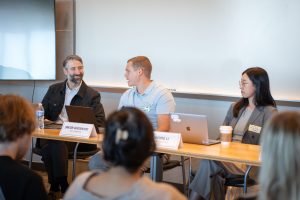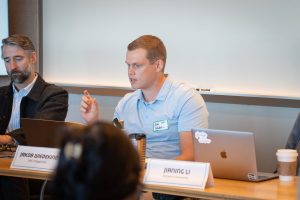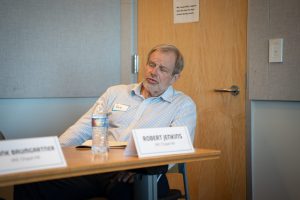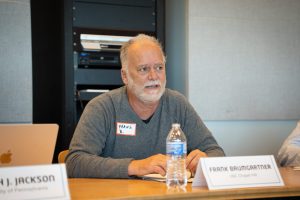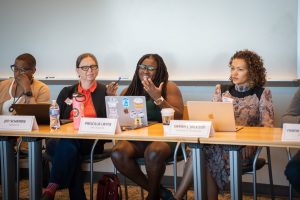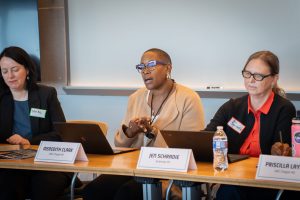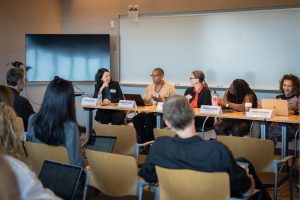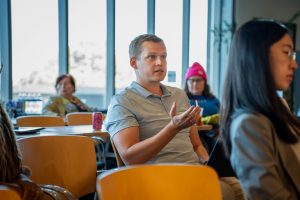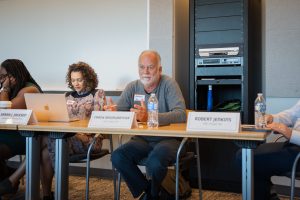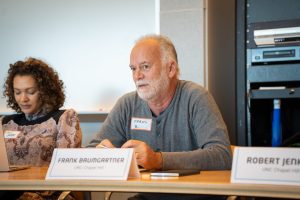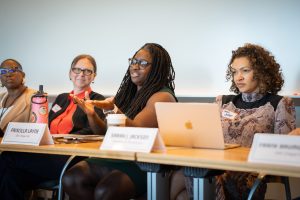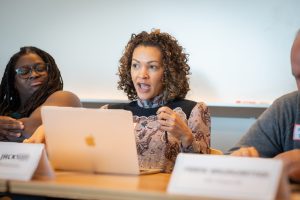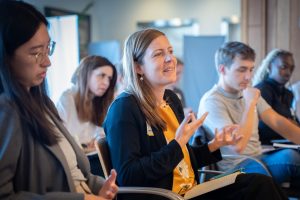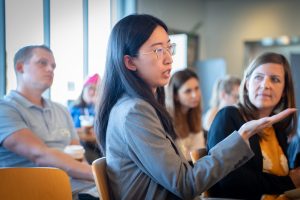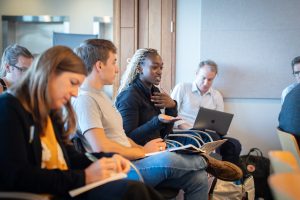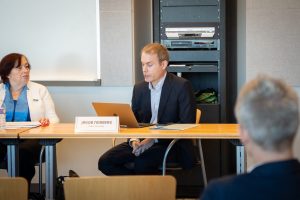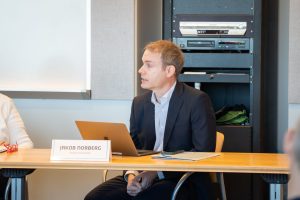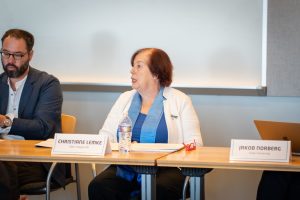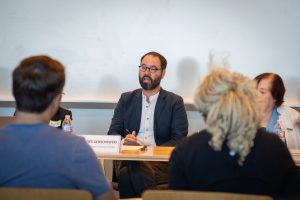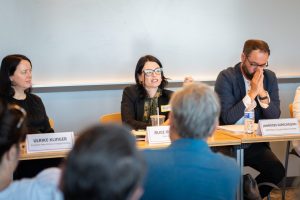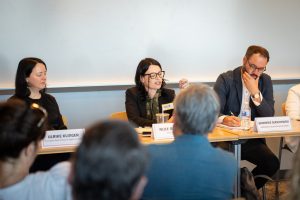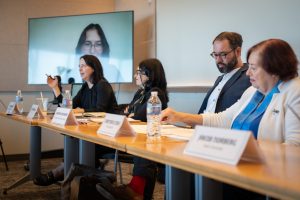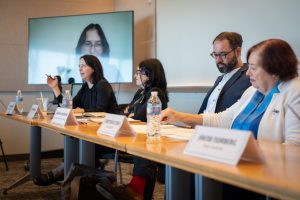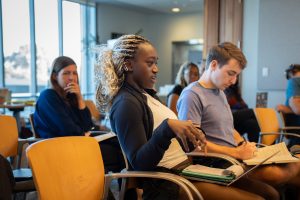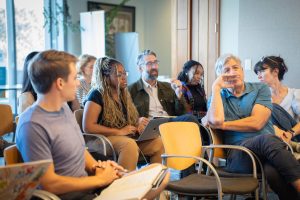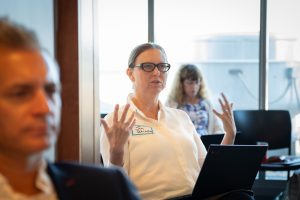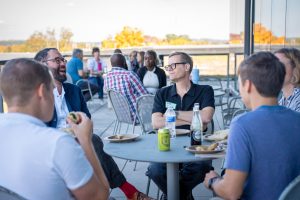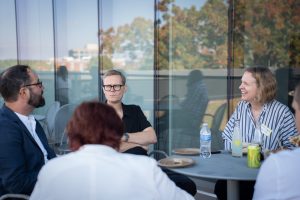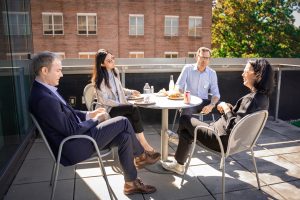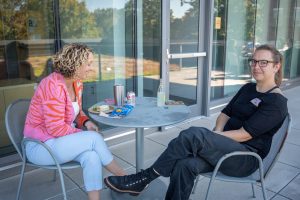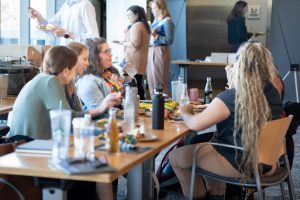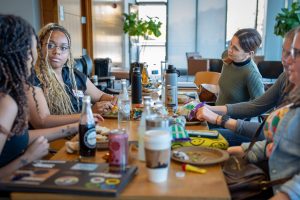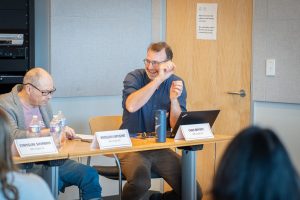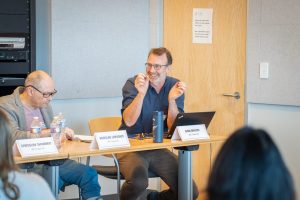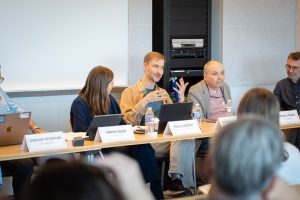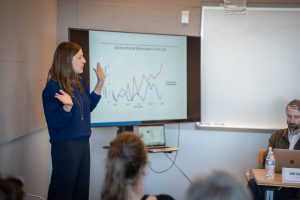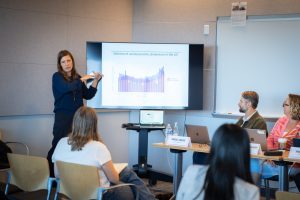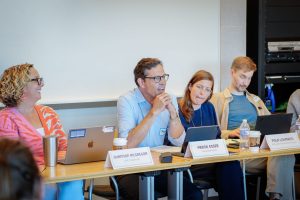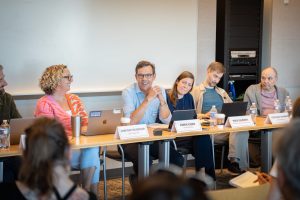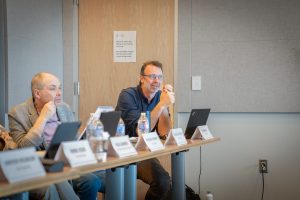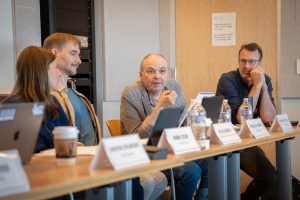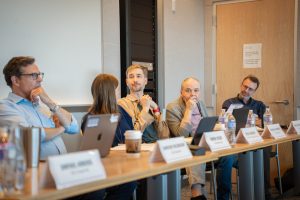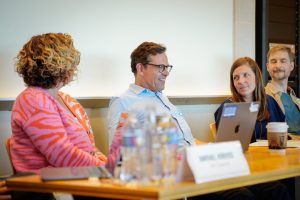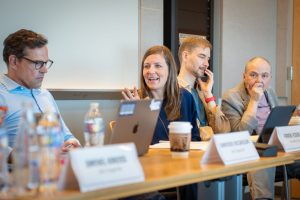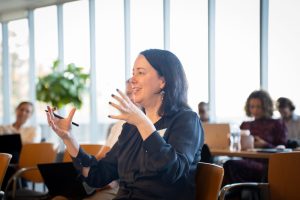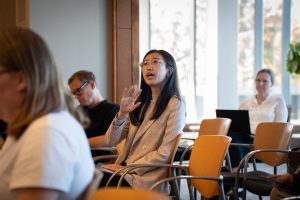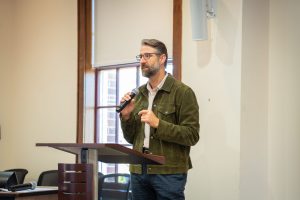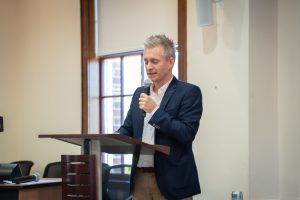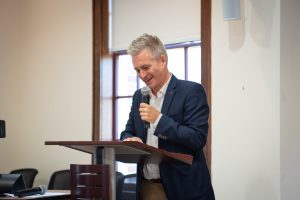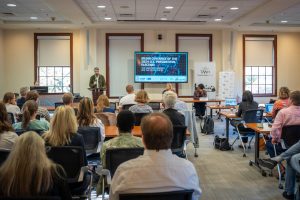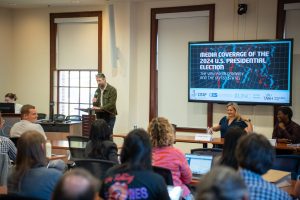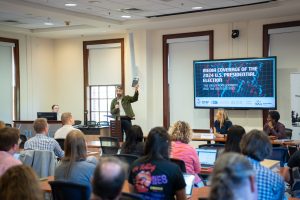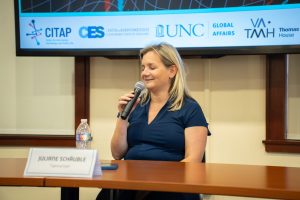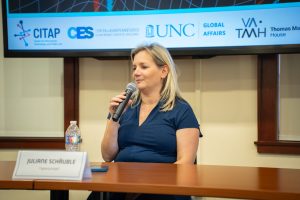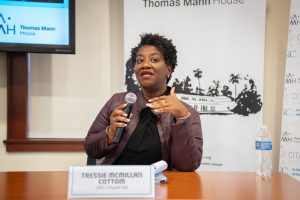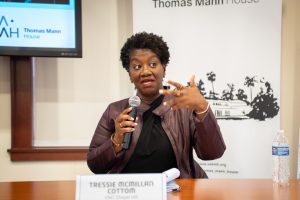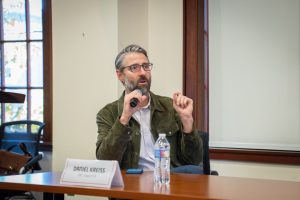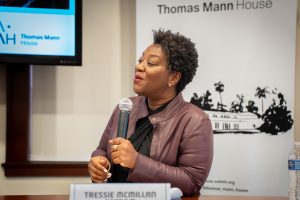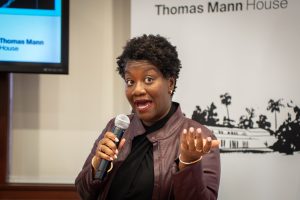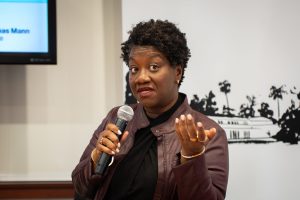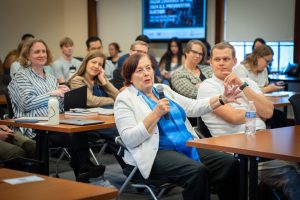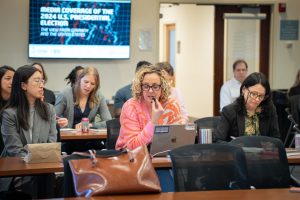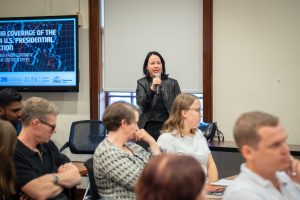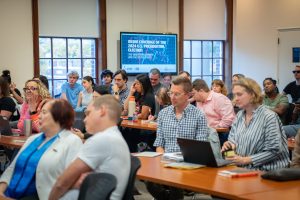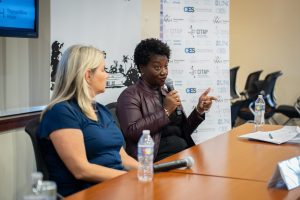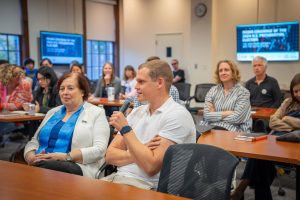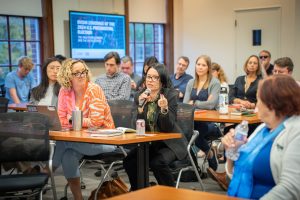
On October 24th, CITAP hosted "Media Coverage of the 2024 U.S. Presidential Election: The View from Germany and the United States," in partnership with UNC Global Affairs, Thomas Mann House Los Angeles, and the UNC Center for European Studies, and co-sponsored by the UNC School of Information and Library Science.
The fireside chat featured Tressie McMillan Cottom, a New York Times columnist, Principal Investigator at CITAP, and Professor at the UNC School of Information and Library Science, alongside Juliane Schäuble, U.S. Correspondent for the German Tagesspiegel newspaper. The conversation was moderated by Daniel Kreiss, Principal Investigator at CITAP and Professor at the UNC Hussman School of Journalism and Media.

The event provided a unique opportunity to explore media dynamics in the 2024 U.S. presidential election from both German and American perspectives. Attendees gained insights into the role of media in shaping public opinion and its implications for democracy in a global context. Juliane emphasized, “It’s so much about the persona—it’s about how somebody is on stage rather than the actual issues.” Juliane also noted that because so much is about the persona of Trump and issues that are over-covered, there are pivotal issues that are missed: “We are missing crucial topics in this election debate—foreign policy, climate change, all left out of the conversation… it doesn’t fit in maybe a 30-second glitz and headline.” Tressie added, “Donald Trump has played the incentives and fears of the media environment like a fiddle. Even when we know it, we can’t stop dancing to his tune.”
The discussion also touched on economic coverage, with Tressie urging a shift toward materialist perspectives that connect economic realities to voter behavior. She noted that economic anxieties are often misrepresented as simple inflation concerns, rather than part of broader social issues. Tressie highlighted the intersection of economic realities and feminist theory, arguing for a broader understanding of economic issues in media coverage. She noted that discussions about inflation often fail to capture the full impact of economic pressures on everyday life, particularly for women, saying “Inflation has become a stylized fact—an easy explanation that often misses the deeper issue of economic struggle, like the high cost of care and the erosion of the social safety net.”
She emphasized that many economic anxieties are rooted in the challenges of managing childcare, elder care, and the overall cost of work, pointing out that these issues are fundamentally linked to gender dynamics in society. Tressie argued that the lack of support systems disproportionately affects women and impacts voter behavior. She called for media coverage that addresses these economic realities more directly, offering a more comprehensive analysis that goes beyond the superficial narratives often found in campaign reporting.
The fireside chat concluded with an engaging Q&A session from the audience exploring media ethics, campaign effectiveness, and coverage gaps in the 2024 election. Attendees raised concerns about media's focus on poll-driven narratives, challenges in balancing critical reporting with objectivity, and the need for deeper coverage of economic and class issues. Tressie and Juliane emphasized that while campaigns can impact turnout, structural factors still favor certain candidates. They called for more nuanced reporting, particularly on underrepresented topics like climate change, economic struggles, and the roles of race and gender in voter decision-making.
Presenting Partners

The Center for Information, Technology, and Public Life (CITAP) is an interdisciplinary research center dedicated to advancing democratic futures through rigorous research that diagnoses and translates the dynamics of power in media, communication, and information ecosystems. From global tech platforms to local news outlets, CITAP equips journalists, policymakers, and the public with critical insights to reimagine and build systems essential for equitable and sustainable progress.
CITAP is supported by its philanthropic partners, including the John S. and James L. Knight Foundation, the William and Flora Hewlett Foundation, Luminate, and the Siegel Family Endowment.
The Center for European Studies (CES) at the University of North Carolina at Chapel Hill advances understanding of the social, political, and economic events that shape contemporary Europe. The overarching mandate of the Center is to enhance undergraduate and graduate instruction in contemporary European studies, to promote scholarship and training for students and faculty from all disciplines and professional schools, and to stimulate institutional and public awareness of Europe’s economic, cultural, and political importance on campus, in North Carolina, and across the nation.
UNC Global Affairs advances the University’s core mission of “leading change to improve society and to help solve the world’s greatest problems” by focusing on high-impact education practices for teaching and learning, investing in Carolina faculty, and delivering Carolina’s Global Guarantee. It equips faculty with the tools and connections to collaborate across departments, institutions, and borders to teach, research, and serve. UNC Global Affairs identifies opportunities, mitigates risks associated with international experiences, and provides global education resources. Additionally, Carolina’s Global Guarantee ensures that every Tar Heel has access to a rich and comprehensive menu of global learning opportunities.
The Thomas Mann House Los Angeles is a residency center owned by the Federal Republic of Germany. The Thomas Mann Fellowships enable academics, pioneering thinkers, and intellectuals who live, or have lived, in Germany to tackle the pressing challenges of our time and to foster the intellectual and cultural exchange between Germany and the United States. It aims to create a vibrant transatlantic space for debate, where outstanding personalities, in dialogue with each other and the host country, address fundamental contemporary and future issues related to politics, society, and culture. Its interdisciplinary program owes much to the spirit of Thomas Mann, who, during his time in the United States, extensively dealt with issues such as the roots of fascism, democratic renewal, freedom, migration, and exile in his literary works, lectures and essays.
The Thomas Mann House brings together German and American interlocutors from different disciplines, intellectual and artistic traditions, and political backgrounds. Fellowships and events facilitate encounters and intellectual exchange. Via lecture tours, workshops, and symposia, as well as radio broadcasts and digital media, the Thomas Mann House is to radiate out from Pacific Palisades across the United States and to Germany. Part of the cultural, academic, and political networks in Southern California, the Thomas Mann House provides important inspiration and ideas for German-American relations.
Co-Sponsor

The UNC School of Information and Library Science (SILS) is one of the top-ranked information schools in the nation. Its world-class faculty take pride in providing high-quality educational opportunities in a dynamic, interdisciplinary learning environment. SILS cultivates an academic environment that is open, representative, and equitable to all. The school shapes the future of information creation, access, use, and management, turning data into information that connects communities and fuels research. SILS' leadership in social informatics, digital curation, information interaction, health informatics, and librarianship drives the way information impacts society and the world.
